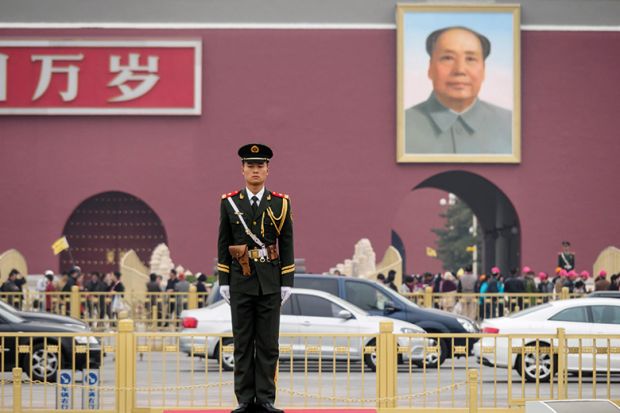In the interwar years, Stalin propagandised the stupendous achievements of Soviet industrialisation, such as the opening of the opulent Moscow metro system. He simultaneously purged his party ranks of its highest members in show trials and launched the Great Terror that would send millions of ordinary Soviet citizens into the gulag. Meanwhile, across the border in China, Mao was living conspicuously simply in a cave and tending his vegetable garden to bolster the credibility of his revolutionary agenda. Following the Second World War, Italy’s charismatic Communist leader Palmiro Togliatti positioned his party as a force for national reconciliation; after winning nearly one-third of the popular vote in democratic elections in 1948, the Communists remained a presence in successive coalition governments. In neighbouring Romania, writes A. James McAdams, Nicolae Ceaușescu “sought security in his own clan” and allowed his wife to “foster her own personality cult”.
For the most part, answers to basic questions such as “What was the communist party?”, “Why did exert it such extraordinary appeal?” and “Why did it collapse so abruptly?” have been parcelled out in scholarly works and popular discussions looking at the party’s rise and fall in a specific place, in the singular context of a particular nation’s politics. Vanguard of the Revolution is the first book of its kind to offer a global view of the party’s 20th-century history. Here we see the major junctures of its development (and reversals) on every continent, in a narrative that shows how diverse, adaptable and even incongruous different communist party strategies could be.
The communist party was a global institution with a notoriously “institutional” structure, codified in its characteristic jargon. Party members themselves emphasised the importance of its institutional features: party cells and directives, soviets and committees, the Comintern and its Congresses, and so forth. Yet it was individual leaders who made all the difference. McAdams’ thesis is quite clear: one can only make sense of the history of the communist party – its rise (or rejection) in unexpected places, its unexpected longevity in other places, its obvious diversity of forms (compare Cuba and Cambodia, for instance) – by examining the crucial impact of the individual personalities who dominated the party in each instance.
“The global idea of the communist party”, in this study, is an idea that was incessantly and often unpredictably shaped by decisive leaders who seized the opportunities they had to monopolise power in its name. Individual leaders could stretch the interpretation of the “communist idea” to remarkable lengths when necessary, as Stalin did when he unapologetically rationalised actions aimed at shoring up national security and “socialism in one country” in the 1930s. The rhetoric of pan-European proletarian solidarity paled in the aftermath of Stalin’s decision to sign a non-aggression pact with the Nazis in 1939. In a contemporary example, we see how the idea of the communist party in North Korea has adaptively accommodated its leaders’ insistence on juche (“self-reliance”) as a feature in the ascent towards true socialism.
Yet the “strong leader” paradigm puts the party in a double bind: every successful communist revolution (fuelled by ideals and action) has been solidified (in practice and policies) with recourse to despotic measures. The temptation to steer the course of “communism” in one’s own country personally, rather than distribute power through faceless institutional mechanisms, meant that party power inevitably ended up in the hands of a single dictator or a very small ruling clique.
McAdams poses the conundrum of the party’s longevity, by asking “once power is monopolized by a single individual, how is it possible for the organization to adopt new policies when it needs to?” Well, it isn’t possible, except in the numerous fascinating examples of “good luck” and “bad luck” that intervened to alter the fortunes of communist regimes all over the world, throughout the 20th century. With great clarity and narrative momentum, Vanguard of the Revolution describes these historical twists and turns, always keeping the focus on the way in which individual party leaders took advantage of them.
When Mikhail Gorbachev came to power in the Soviet Union, however, he seemed to think that the institution would survive its new leader’s reformist impulse to question the effectiveness and “vanguard status” of the party’s current functioning. Da nyet! Without the leader’s determination to maintain the party’s monopoly on power at any cost, the party itself seemed devoid of power. Thus, in McAdams’ interpretation, the abrupt collapse of the Communist Party of the Soviet Union in 1990 cannot be seen as inevitable, or as the deserved fate of an obviously flawed idea. It could have happened earlier, or later, or differently, had a different leader reinterpreted the party’s right to lead in a different way.
Although the final chapter (largely focused on Gorbachev) is titled “The Party Vanishes”, it provides the contrary example of the Chinese Communist Party today under Xi Jinping, who defends the legitimacy of his party’s autocratic rule with vague references to the early communists’ “fighting spirit”, without any further nods to foundational Marxist-Leninist concepts such as validating the working class and defeating capitalism. In fact, the last time a charismatic communist party leader actually insisted on “class warfare” was in the 1980s, when Albania’s isolated dictator Enver Hoxha functioned as what McAdams calls an “ideological aphrodisiac” to radical anti-establishment groups throughout Asia, Africa and Europe. Hoxha’s Stalinist ambitions were already incongruous in an age when established communist regimes did everything they could (including the dispensation of “bourgeois” luxuries and favours to party members) to maintain stability.
Here is the place to emphasise the astonishing readability of this account: the general reader is rewarded with a brilliant and sweeping introduction to one of the most provocative political institutions of our times. Endnotes and a list of suggested readings are included. McAdams introduces his project as “a post-mortem on the long life and unexpected demise of a global institution”. In the lengthy volume that follows, he takes us from a still-inspirational account of the party’s genuine appeal to masses of people in a variety of different turn-of-the-last-century settings to vivid descriptions of the party’s fortunes – always decisively manipulated by the singular personality of a leader – in the Soviet Union, China, Spain, Albania and the Soviet Bloc in Eastern Europe, Cuba and Cambodia.
In the end, as we know, the ideas that animated the communist party evaporated. A set of malleable ideas that once had efficacy in the “revolutionary struggle” for many things, including workers’ rights, or rapid modernisation, or national self-determination, didn’t have any real efficacy in facing up to the exigencies of late 20th-century society. So what does this mean for our children, who have inherited a world rife with social inequality, yawning socioeconomic gaps between peoples and countries, as well as a desire for some kind of ecological harmony and spiritual grace?
Is the communist party completely irrelevant? Maybe it is. But its history is more relevant than ever, and Vanguard of the Revolution provides intellectual provocation, historical breadth and an inspiration to take better care of our fragile democracies.
Yvonne Howell is professor of Russian and international studies at the University of Richmond, Virginia.
Vanguard of the Revolution: The Global Idea of the Communist Party
By A. James McAdams
Princeton University Press, 584pp, £27.95
ISBN 9780691168944
Published 4 October 2017

The author
A. James McAdams, William M. Scholl professor of international affairs (and director of the Nanovic Institute for European Studies) at the University of Notre Dame, describes himself as “a typical product of American mobility. I was born on one coast, in Baltimore, and then moved as a child to the other, near Berkeley. I must have been imbued with the free-wheeling temperament of northern California. When we subsequently moved to Cincinnati at the height of the Vietnam War protests, I was horrified by its Midwestern, conservative culture.”
After studying political theory at a Quaker college in Indiana, McAdams went to the Free University in West Berlin, where he “fell in love with the twin opportunities of a city divided by the Cold War. In the morning, I could listen to the quarrels of pro-Soviet communists, Trotskyists and self-proclaimed Maoists over American imperialism. And then in the afternoon, I could go…into East Berlin and get a taste for what it meant to live under ‘real-existing socialism’…The two Germanys were literally laboratories for testing contending ideologies.”
Researching Vanguard of the Revolution meant that McAdams has “travelled to nearly every communist country or formerly communist country in the world. Generally, I avoid organised tours. However, in a few cases, such as during a trip to North Korea, I have found that a structured visit is the most efficient way to learn about the country.”
Although the communist party seems to have had its day, McAdams believes that “the mortality of all political institutions” has sobering lessons. “Liberally minded politicians are increasingly unable to convince their citizens that moderate catch-all parties can be counted on to address their needs. The rise of populist right-wing parties throughout Western democracies shows us just how easily support for responsible leadership can degenerate into extremism.”
Matthew Reisz
POSTSCRIPT:
Print headline: The men who flew the red flag
Register to continue
Why register?
- Registration is free and only takes a moment
- Once registered, you can read 3 articles a month
- Sign up for our newsletter
Subscribe
Or subscribe for unlimited access to:
- Unlimited access to news, views, insights & reviews
- Digital editions
- Digital access to THE’s university and college rankings analysis
Already registered or a current subscriber?




